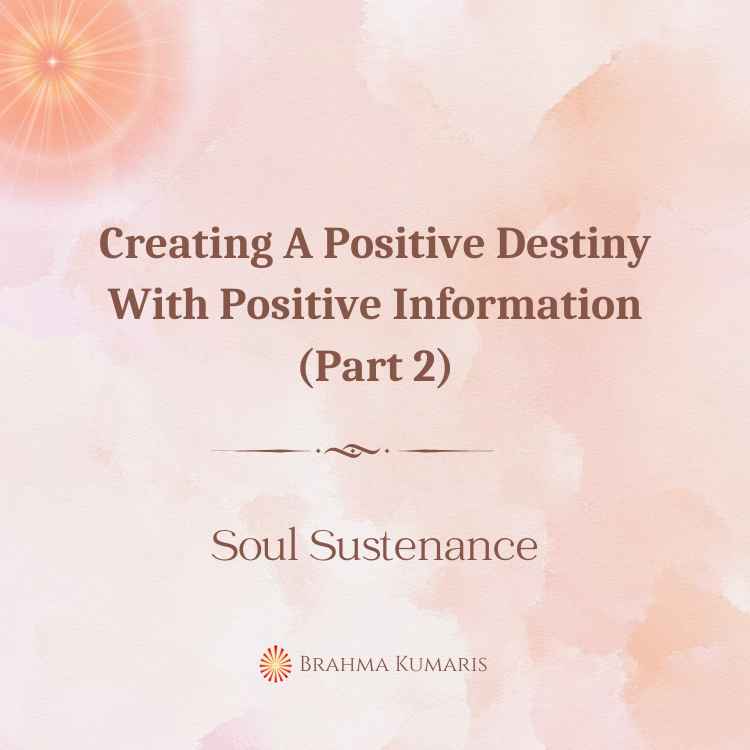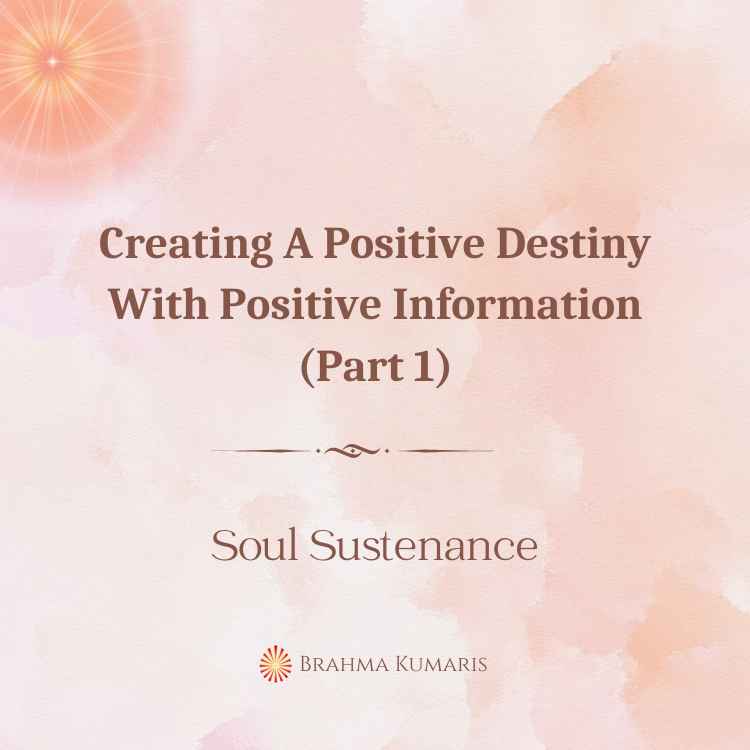Songs & Guided Meditation
15 Tracks
00:00
Navratri is an opportunity to celebrate, rejoice, and rekindle our spirituality. During Navratri, we celebrate the nine forms of “Goddess Durga or Shakti”, who symbolises purity and divinity, while the depiction of demons like Ravana at her feet represents the five negative Sanskar, including lust, anger, greed, attachment, and ego.. Thus, Navratri serves as an occasion to invoke the deities in our quest to transcend these negative traits and habits.
Let’s explore the true essence of Navratri. In the days to come, we’ll explore the profound meanings of the eight powers and also how we can inculcate it in our lives. We will see how to invoke a power daily, how to emerge it and how to use it practically. We will understand which Devi does each power symbolises and what is each Devi teaching us. Empower Yourself, Empower the World!”
Take an in-depth journey through comprehensive article series to uncover the profound significance of Navratri, which also helps to invoke divinity, Shakti and Power Within by Connecting Supreme.
Fasting for nine days is an important ritual, but it should be undertaken as a conscious resolution to bring purity, positivity, and discipline into our lives, enhancing the power of the soul. ‘Vrat’ means pledge; taking a vow that I, the soul, will follow some disciplines. For the 9 days of Navratri, let us take this vow to a deeper level. We will not limit it only to our diet. We will take a vow that ‘we will not get angry during these 9 days’, ‘we will remain peaceful’. We will not keep thinking about other people, or discuss one person’s weakness with another. We will take a vow to wake up early for the next 9 days and meditate. We will not eat or drink anything that is harmful, for the next 9 days. We have so many aspects to take a vow. It is very important that we take vows. By taking a vow and upholding it, the soul power increases. Because we start living a life of discipline and discipline increases will power.
The intention behind festivals is to teach us the right ways of living. Divinity and satvik practices go together. This means if we consume tamasik food, we cannot emerge divinity. Satvik means not just vegetarian food prepared without onion and garlic, but also prepared in remembrance of God. Food is to be prepared with a satvik state of mind. We need to ensure that the money that comes home is earned through Satvik means. Then ensure that satvik food is prepared, remaining in a satvik state of mind. Such food becomes ‘prasad’ (consecrated food). When we are ready to eat satvik food, check if you want to restrict it to only 9 days. Do we want a divine life for 9 days? Whatever we do over these 9 days, we can follow them for a lifetime.
Remember, that the vows taken in these 9 days are not to remain just in our words. Sometimes the mind tends to count – “today is the 5th day” or “today is the 6th day” or ”when will the 9 days get over?”or we say “everyone is doing, I am having to follow these practices.”. Let us never do it with a sense of helplessness, otherwise soul power will never increase. We need to willingly take the vow of bringing in satvik qualities into our life.
Clay or mud signifies our body; the wick signifies the soul. So the lamp must remain lit throughout the 9 days. When the consciousness that ‘I am a soul’ emerges, then the wick remains lighted and its brightness spreads all around. And most importantly, we shift from ‘wanting’ to ‘giving’ mode (‘diya’ means act of giving).
While the diya is glowing, life is said to be auspicious. The diya (act of giving) of love, respect, co-operation; give it to everyone and give it always. When this ‘diya’ remains lighted, life will remain auspicious.
Devotees often engage in Jaagran during the 9 days of Navratri. It refers to an awakening from the night of our ignorance. When the world is gripped by the darkness of Kalyug, when the darkness of ignorance is widespread there is a need for awakening. Awakening means waking up from the night of ignorance. It signifies awakening to a new way of thinking and living based on spiritual wisdom. We have been sleeping in the night of ignorance, so we need to wake up. This is ‘Jaagran’. So, staying awake at night (Jaagran) means waking up from the sleep of ignorance. We need not be awake at night to invoke divinity.
Awakening, satvik lifestyle, upholding vows and keeping the Diya lit; when all these are followed, relationships become very harmonious. Adjusting and co-operating with others becomes the natural way of living. The adjustment in relationships which creates harmony is symbolised by ‘raas’ and ‘garba’ which we perform. Raas and garbha are beautiful dance forms where each one holds 2 sticks in their hands. When each dancer notices the other dancer and accordingly wields her sticks, they create a rhythm. They are in harmony with each other, it creates a beautiful dance form. But if one keeps wielding their sticks in any random direction without coordinating, it resembles a battlefield.
The dancers represent the people that we live with, and those that we work with. So we need to first look at their sanskar and accordingly bring our sanskar into action. When we do this, it becomes a ‘raas’ of our sanskars. But if we are unmindful of their sanskars and keep using ours, then our house resembles a battlefield (conflict in relationships).
God teaches us that a soul who awakens from his vices, takes a vow to follow disciplines in life, embraces a satvik lifestyle, and when soul consciousness becomes natural, that soul performs beautiful ‘raas’ of sanskars with others. So during navratri let’s not just invoke the Deities but also invoke the divine powers within ourselves.
A child born with 8 arms is not considered normal. The 8 arms depicted in deities are not present literally or physically. They are symbolic of 8 powers of the soul through which divinity emerges. Arms are representative of power. Physical power is represented in hands or shoulders, hence symbolised by arms. Each arm is shown holding a weapon; each is a weapon of knowledge. The deeper significance is that using the weapon of knowledge, the soul uses its powers within. When through its weapon of knowledge, a soul uses its own powers in life, divinity emerges. And when divinity emerges, vices get automatically merged.
Divinity and purity are the original qualities of the soul which we have forgotten today. When we forget our divinity, the vices within us like lust, anger, attachment, greed and ego emerge. Our divinity gets merged and our vices get emerged. If someone wants to represent it symbolically; ‘that divinity has overpowered the vices’ or that purity has overpowered ego then how will they represent it symbolically. The vices or the demons shown below the feet of the deities are not the demons that physically existed. They simply represent the vices within us; which means the negativity within us, the wrong habits and the weaknesses within us.
The vices within us like jealousy, hatred, rejection, manipulation, control, domination, the list is long. But since we did not pay attention, we have awakened the demon/vices within us. Now is the time for us to invoke the divinity within us. When our divinity gets emerged, our vices automatically get merged. When our vices get emerged, our divinity automatically gets merged. At any point of time, only one quality of sanskar can remain awakened.
So, invoking the shakti/Devi means invoking the divinity. So a Devi is not to be invoked from somewhere above us, we need to invoke the divinity within us. Because divinity is present in every soul, Weakness is also present in every soul. The divinity which we are lovingly remembering and invoking today lies within us and the demon that is shown lying under the feet of the deity also lies within us. Otherwise, a Devi or Deity whom we refer to 16 as celestial degrees complete and an epitome of dignity and whose highest moral value is non- violence; how can we depict those deities indulging in acts of violence.
The 8 hands of the Devis are actually symbolic of the inner powers that soul attains when it connects its mind and intellect with the Supreme Soul (God). If we give a thought on this, we will realise that the nature of powers needed in today’s world to overcome the evil (within and around us) are more subtle in nature rather than being physical weapons. Let us understand the spiritual significance of the 8 divine powers of the soul.
This is a power of the mind to be able to withdraw itself from the negative and the unnecessary. The widespread problem of overthinking, over-reacting and experiencing grief in return is mainly due to the lack of this power. Today our focus largely lies on other people and external events, which is why they have shaped our personality. Therefore, just like a tortoise pulls its head and legs when not required to use them; we too need to withdraw our attention from the outside world to our inner world to keep experiencing and enhancing the peace within. This ability to be able to withdraw our mind in a second is called the Power to Withdraw. It would save our energy from leaking, providing us with more inner strength and stability.
Real co-operation comes from deeper spaces of attitude, feeling and vision. Co-operation is seeing another’s positive traits and offering them powerful thoughts towards success. It is a fabric of unity, song of harmony and road to prosperity. If each individual willingly co-operates with others around, there shall be no challenge or situation that cannot be crossed or won. But the self-centered nature today doesn’t allow people to co-operate with others unless they find a personal benefit behind it. Hence, being able to co-operate with everyone who needs our help (in their righteous deeds) by thoughts, words and actions is a great inner power which enables us to fly over mountains of obstacles.
Today due to lack of knowledge and inner strength, people have lost the power to face. Even in the smallest of failures, they aren’t able to face themselves, their teachers / mentors or family / parents. This leads to a storm of thoughts within which in extreme cases leads to suicides. Hence, power to face means to accept what has happened (to the extent of death of someone beloved) and face it with greater strength so that we don’t just see what happened but also see what can be done next. This inner strength instills courage which is one of the greatest virtues personified in Devis.
To be able to discern the good from bad, the right from wrong requires knowledge. An intellect filled with divine knowledge is the one which possesses the Power of Discrimination. Such a person, in any situation, can clearly see what is right and what is wrong, which path (thoughts, words and actions) is to be taken and which one not. Lack of this power leads to indecisiveness, confusion and often leads the individual to the path of unrighteousness, which appears to be more lucrative than the righteous path. However, one who possesses this power, finds success in whatever he does, because the foundation of such deeds is knowledge and truth.
As a balance shows the correct figure only when the two scales of a balance are stable. Similarly, the intellect gives correct judgement only when there is inner stability. Sometimes, only finding out what is right and what is wrong is not enough. We also need to take the judgement to do what is right. Today, many people even after discerning rightly, knowing what is right and what is wrong, take the path of wrong saying that truth doesn’t work in today’s world. Further, our future depends on the judgments we make today. Hence, making the right judgements, leads to the right response which moves us closer to success and a peaceful future. Hence, this power too is an inner power of the soul.
No two people are alike in this world and no one today is complete. Acknowledging other people in ‘our’ universe is important if we wish to be part of theirs. Accommodating others means accepting people and situations as they are and adjusting or moulding ourselves to have the best outcome, instead of trying to change others. Acceptance doesn’t necessarily mean agreement. Acceptance means considering others ideas and suggestions, giving it a thought and while righteously deciding, with proper reasoning, whether to continue with their idea or not. Acceptance also means, accepting people while knowing that they have certain shortcomings, and then trying to work with their strengths. Acceptance from our end naturally develops acceptance from others end. To be able to mould ourselves requires inner power and this is what Power to Accommodate is all about.
Tolerance, often considered as a weakness is actually a strength. A tendril tolerates the strong winds by bending itself and so it lives through the storms, while the strong rigid trees are often found uprooted after the storms pass away. Hence, to be able to tolerate, in whatever situation comes in front of us is a demonstration of our flexibility which enables us to pass through the most difficult situations. Secondly, we are all aware of the fact that the world pelter’s stones on a fruit bearing tree, but the tree in return gives sweet fruits, because one can only give to others what one possesses. Hence, no matter what the world gives me, I should be able to give what is good (at the level of thoughts, words and actions). This requires great inner strength which comes in the form of Power to Tolerate.
This is a power which comes from the practice of detachment. Like an Army officer is always detached from the place where he is posted, as he is all the time prepared to move to any other location on one instruction of the commander. Similarly, while living in this world and doing all what is required, we need to detach our mind and intellect from the material things and relations, so that we can perform all our actions in a much impartial manner. The more we are detached, the more our mind and intellect becomes efficient, as the unnecessary chattering and questioning of the mind gets controlled. But to detach ourselves, requires the practice of knowledge and inner power.
So let us make efforts; to invoke these 8 powers within me, the soul. Especially during Navratri, we need to invoke these powers. Thus, we can understand that anyone who possesses the above mentioned 8 powers cannot be defeated by any situation and shall always be victorious and successful.
This new song gives a very brief description of our 8 Inner powers of the soul and how awakening these powers will not only enlighten us but work as a guiding light for those around us.

A special relationship that we all hold with each other is of sharing joy and love with each other which keeps us full of energy

We want a destiny of peace, love, happiness, health, wealth and harmony. To change our destiny, we will need to create the right thoughts and

In this information age, we have an overflow of knowledge. Do we pause and check the quality of the information we are consuming? Does it
Start your day with a breeze of positivity and stay motivated with these daily affirmations
After Clicking on Join, You will be redirected to Whatsapp Community to receive daily message. Your identitiy will be secured and no group member will know about another group member who have joined.